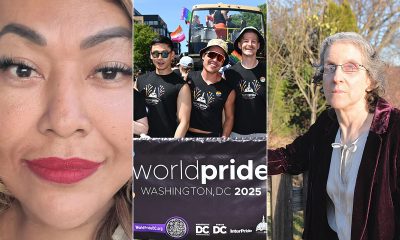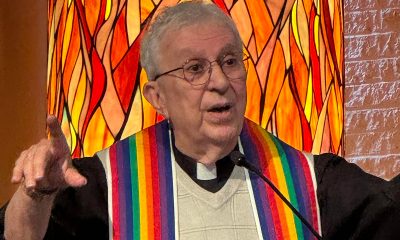National
World news in brief
Anglicans cut Episcopalians from ecumenical bodies & more

Anglicans cut Episcopalians from ecumenical bodies
LONDON — The Anglican Communion has suspended U.S. Episcopalians from serving on ecumenical bodies because of the election of a lesbian as a bishop in California.
The Associated Press reported that the U.S. church opened a rift in the global communion, and within its own ranks, seven years ago by electing a gay man, V. Gene Robinson, as bishop of New Hampshire. Conservative African Anglicans have taken a lead in opposing moves in the United States and Canada to promote gays and to bless same-sex relationships.
Rowan Williams, the archbishop of Canterbury and spiritual leader of the Anglican Communion, had called for a moratorium on appointing gays to leadership positions. He asked for action against the Episcopal Church after the Rev. Canon Mary Glasspool was made an assistant bishop of Los Angeles.
The Anglican Communion is an association of 44 regional and national member churches, most founded by Church of England missionaries, with more than 80 million members in more than 160 countries.
According to the Associated Press, the Rev. Canon Kenneth Kearon, secretary general of the Anglican Communion, announced June 7 that Episcopalians had been downgraded from members to consultants in formal ecumenical dialogues, annual meetings between Anglicans and clergy in other churches intended to build friendship and better understand one another’s traditions and issues of mutual concern such as points of theology and ways of worshipping.
Kearon said he had also written to the primate of the Anglican Church of Canada to ask whether it has formally adopted a policy backing same-sex blessings, the Associated Press reported.
The Episcopal News Service said the Rev. Katherine Grieb, an Episcopal priest and professor of New Testament at Virginia Theological Seminary, was downgraded from member to consultant to the Inter Anglican Standing Commission on Unity Faith & Order.
Those who were stripped of membership in ecumenical dialogues, according to ENS, were the Rev. Thomas Ferguson and Assistant Bishop William Gregg of North Carolina, both involved in the Anglican-Orthodox Theological Dialogue; Bishop C. Franklin Brookhart of Montana had been a member of the Anglican-Methodist International Commission for Unity in Mission; and the Rev. William Petersen, professor of ecclesiastical and ecumenical history of Bexley Hall in Columbus, Ohio, who was serving on the Anglican-Lutheran International Commission.
Gay love exhibition opens in Warsaw museum
WARSAW, Poland — The director of Poland’s National Museum says an exhibition on gay and lesbian love is designed to provoke discussion on the place of homosexuals in this conservative and overwhelmingly Catholic country.
The head of the National Museum in Warsaw, Piotr Piotrowski, told the Associated Press in advance of the exhibition’s June 11 opening that the museum is already getting protests from various groups.
The exhibition runs through Sept. 5 and primarily features male nudes and same-sex couples depicted in ancient sculpture and contemporary painting and photography.
According to the Associated Press, Culture Minister Bogdan Zdrojewski last year spoke in defense of the exhibition after an opposition lawmaker protested the project.
Thousands celebrate Berlin’s gay pride parade
BERLIN — Tens of thousands of gays, lesbians and other revelers marched and danced in downtown Berlin last weekend for the German capital’s annual gay pride celebration, which features a colorful parade through the heart of the city.
Under the motto “Normal is different,” an estimated 250,000 people lined the route for the Christopher Street Day parade June 19, as some 50 floats carrying dancers wove through the city streets, the Associated Press reported.
Christopher Street Day commemorates the start of the gay rights movement in New York’s Greenwich Village in 1969 and the parade generally draws large crowds in Berlin, which has a history as a gay metropolis going back as far as the 19th century.
U.S. Supreme Court
Supreme Court to consider bans on trans athletes in school sports
27 states have passed laws limiting participation in athletics programs

The U.S. Supreme Court on Thursday agreed to hear two cases involving transgender youth challenging bans prohibiting them from participating in school sports.
In Little v. Hecox, plaintiffs represented by the ACLU, Legal Voice, and the law firm Cooley are challenging Idaho’s 2020 ban, which requires sex testing to adjudicate questions of an athlete’s eligibility.
The 9th U.S. Circuit Court of Appeals described the process in a 2023 decision halting the policy’s enforcement pending an outcome in the litigation. The “sex dispute verification process, whereby any individual can ‘dispute’ the sex of any female student athlete in the state of Idaho,” the court wrote, would “require her to undergo intrusive medical procedures to verify her sex, including gynecological exams.”
In West Virginia v. B.P.J., Lambda Legal, the ACLU, the ACLU of West Virginia, and Cooley are representing a trans middle school student challenging the Mountain State’s 2021 ban on trans athletes.
The plaintiff was participating in cross country when the law was passed, taking puberty blockers that would have significantly reduced the chances that she could have a physiological advantage over cisgender peers.
“Like any other educational program, school athletic programs should be accessible for everyone regardless of their sex or transgender status,” said Joshua Block, senior counsel for the ACLU’s LGBTQ and HIV Project. “Trans kids play sports for the same reasons their peers do — to learn perseverance, dedication, teamwork, and to simply have fun with their friends,” Block said.
He added, “Categorically excluding kids from school sports just because they are transgender will only make our schools less safe and more hurtful places for all youth. We believe the lower courts were right to block these discriminatory laws, and we will continue to defend the freedom of all kids to play.”
“Our client just wants to play sports with her friends and peers,” said Lambda Legal Senior Counsel Tara Borelli. “Everyone understands the value of participating in team athletics, for fitness, leadership, socialization, and myriad other benefits.”
Borelli continued, “The U.S. Court of Appeals for the Fourth Circuit last April issued a thoughtful and thorough ruling allowing B.P.J. to continue participating in track events. That well-reasoned decision should stand the test of time, and we stand ready to defend it.”
Shortly after taking control of both legislative chambers, Republican members of Congress tried — unsuccessfully — to pass a national ban like those now enforced in 27 states since 2020.
Federal Government
UPenn erases Lia Thomas’s records as part of settlement with White House
University agreed to ban trans women from women’s sports teams

In a settlement with the Trump-Vance administration announced on Tuesday, the University of Pennsylvania will ban transgender athletes from competing and erase swimming records set by transgender former student Lia Thomas.
The U.S. Department of Education’s Office for Civil Rights found the university in violation of Title IX, the federal rights law barring sex based discrimination in educational institutions, by “permitting males to compete in women’s intercollegiate athletics and to occupy women-only intimate facilities.”
The statement issued by University of Pennsylvania President J. Larry Jameson highlighted how the law’s interpretation was changed substantially under President Donald Trump’s second term.
“The Department of Education OCR investigated the participation of one transgender athlete on the women’s swimming team three years ago, during the 2021-2022 swim season,” he wrote. “At that time, Penn was in compliance with NCAA eligibility rules and Title IX as then interpreted.”
Jameson continued, “Penn has always followed — and continues to follow — Title IX and the applicable policy of the NCAA regarding transgender athletes. NCAA eligibility rules changed in February 2025 with Executive Orders 14168 and 14201 and Penn will continue to adhere to these new rules.”
Writing that “we acknowledge that some student-athletes were disadvantaged by these rules” in place while Thomas was allowed to compete, the university president added, “We recognize this and will apologize to those who experienced a competitive disadvantage or experienced anxiety because of the policies in effect at the time.”
“Today’s resolution agreement with UPenn is yet another example of the Trump effect in action,” Education Secretary Linda McMahon said in a statement. “Thanks to the leadership of President Trump, UPenn has agreed both to apologize for its past Title IX violations and to ensure that women’s sports are protected at the university for future generations of female athletes.”
Under former President Joe Biden, the department’s Office of Civil Rights sought to protect against anti-LGBTQ discrimination in education, bringing investigations and enforcement actions in cases where school officials might, for example, require trans students to use restrooms and facilities consistent with their birth sex or fail to respond to peer harassment over their gender identity.
Much of the legal reasoning behind the Biden-Harris administration’s positions extended from the 2020 U.S. Supreme Court case Bostock v. Clayton County, which found that sex-based discrimination includes that which is based on sexual orientation or gender identity under Title VII rules covering employment practices.
The Trump-Vance administration last week put the state of California on notice that its trans athlete policies were, or once were, in violation of Title IX, which comes amid the ongoing battle with Maine over the same issue.
New York
Two teens shot steps from Stonewall Inn after NYC Pride parade
One of the victims remains in critical condition

On Sunday night, following the annual NYC Pride March, two girls were shot in Sheridan Square, feet away from the historic Stonewall Inn.
According to an NYPD report, the two girls, aged 16 and 17, were shot around 10:15 p.m. as Pride festivities began to wind down. The 16-year-old was struck in the head and, according to police sources, is said to be in critical condition, while the 17-year-old was said to be in stable condition.
The Washington Blade confirmed with the NYPD the details from the police reports and learned no arrests had been made as of noon Monday.
The shooting took place in the Greenwich Village neighborhood of Manhattan, mere feet away from the most famous gay bar in the city — if not the world — the Stonewall Inn. Earlier that day, hundreds of thousands of people marched down Christopher Street to celebrate 55 years of LGBTQ people standing up for their rights.
In June 1969, after police raided the Stonewall Inn, members of the LGBTQ community pushed back, sparking what became known as the Stonewall riots. Over the course of two days, LGBTQ New Yorkers protested the discriminatory policing of queer spaces across the city and mobilized to speak out — and throw bottles if need be — at officers attempting to suppress their existence.
The following year, LGBTQ people returned to the Stonewall Inn and marched through the same streets where queer New Yorkers had been arrested, marking the first “Gay Pride March” in history and declaring that LGBTQ people were not going anywhere.
New York State Assemblywoman Deborah Glick, whose district includes Greenwich Village, took to social media to comment on the shooting.
“After decades of peaceful Pride celebrations — this year gun fire and two people shot near the Stonewall Inn is a reminder that gun violence is everywhere,” the lesbian lawmaker said on X. “Guns are a problem despite the NRA BS.”


















